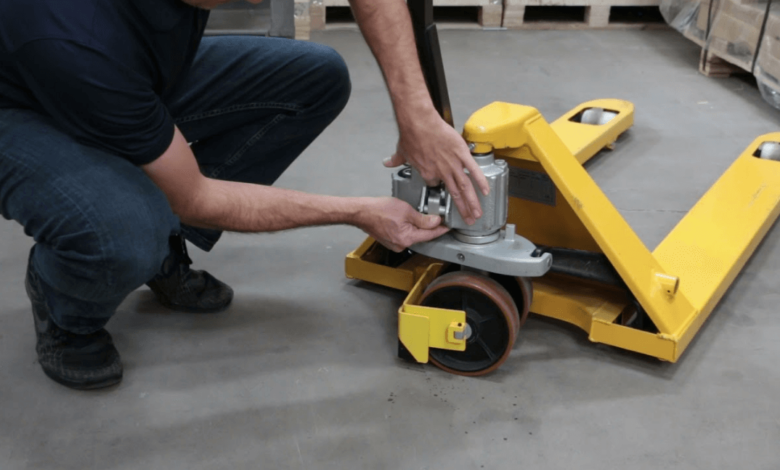Pallet Jack Repair: Keeping Your Equipment in Top Shape

In the bustling world of logistics and warehousing, pallet jacks play a crucial role in the seamless movement of goods. However, like any piece of machinery, they are not immune to wear and tear. Pallet repair is an essential aspect of maintaining the efficiency and safety of your operations. In this article, we’ll dive into the ins and outs of pallet jack repair, from common issues to preventative measures.
Understanding Pallet Jack repair
What are Pallet Jacks?
Pallet jack repair, also known as pallet trucks, are compact and maneuverable tools used to lift and move palletized loads within warehouses, distribution centers, and other industrial settings. They come in various types, including manual and electric pallet jacks, each designed for specific tasks and load capacities.
Types of Pallet Jacks
Manual pallet jacks require physical effort from the operator to pump the handle and lift the load. On the other hand, electric pallet jacks are powered by rechargeable batteries, making them suitable for heavier loads and reducing the strain on the operator.
Importance of Pallet Jacks in Material Handling
Pallet jacks streamline material handling processes by allowing operators to move heavy loads efficiently. They contribute to the smooth flow of goods from one point to another, minimizing downtime and increasing productivity.
Common Pallet Jack Problems
Worn-out Wheels and Rollers
The wheels and rollers of a pallet jack endure substantial friction and wear. Over time, they can become worn-out, affecting the maneuverability and stability of the equipment.
Hydraulic System Issues
The hydraulic system powers the lifting mechanism of the pallet jack. Issues such as slow lifting, jerky movements, or failure to lift are signs of hydraulic problems. Proper maintenance, including hydraulic fluid checks and replacements, can prevent these issues.
Leaking Oil or Hydraulic Fluid
Oil or hydraulic fluid leaks are common and can indicate seal or hose damage. Ignoring leaks can lead to further damage to the hydraulic system.
Damaged Handle and Controls
The handle, control lever, and other operating components of a pallet jack can suffer damage due to constant use. Cracks, bends, or malfunctions in these parts can compromise the operator’s control over the equipment.
DIY Repairs and Maintenance
Safety First: Precautions Before Repair
Before attempting any repairs, ensure the pallet jack is on stable ground and the load is fully lowered. Wear appropriate safety gear, and if unsure, it’s best to consult a professional.
Changing Wheels and Rollers
Replacing wheels and rollers is a common maintenance task. Raise the pallet jack, remove the old components, and install the new ones according to the manufacturer’s instructions.
Hydraulic System Maintenance
Regularly check hydraulic fluid levels and quality. Follow the manufacturer’s guidelines for fluid replacement. If the hydraulic system shows signs of trouble, consult a professional.
Fixing Minor Leaks
For minor oil or hydraulic fluid leaks, identify the source and tighten or replace the affected seals or hoses.
When to Call a Professional
Complex Hydraulic System Repairs
If the hydraulic system requires extensive repairs, such as cylinder replacements or pump overhauls, it’s best to seek professional assistance. Complex repairs may involve specialized tools and expertise.
Electrical Component Malfunctions
Electric pallet jacks can experience issues with their electrical components, such as wiring and controls. These repairs are best left to professionals to avoid electrical hazards.
Structural Damage
Significant structural damage, like bent forks or a twisted frame, can compromise the integrity of the pallet jack. Professional repair technicians can assess the damage and determine if repairs are feasible.
Preventative Measures for Longevity
Regular Inspections and Lubrication
Frequent inspections help catch issues early.
Training and Proper Usage
Properly train operators on pallet jack usage to minimize accidental damage. Misuse and overloading can lead to premature wear and breakdowns.
Storing Pallet Jacks Correctly
When not in use, store pallet jacks in a dry, clean environment. Avoid exposure to extreme temperatures and corrosive substances.
Cost Considerations
DIY vs. Professional Repairs
While DIY repairs may save money initially, they can lead to costly mistakes if not done correctly. Professional repairs ensure accurate diagnosis and proper fixes.
Replacement Parts and Expenses
Sourcing genuine replacement parts might come at a higher cost, but they guarantee compatibility and reliability, ultimately saving money in the long run.
Benefits of Timely Repairs
Enhanced Workplace Safety
Well-maintained pallet jacks reduce the risk of accidents and injuries, fostering a safer working environment for all employees.
Increased Equipment Lifespan
Regular maintenance and timely repairs extend the lifespan of pallet jacks, delaying the need for replacements.
Improved Operational Efficiency
Efficiently operating pallet jacks contribute to smooth operations, preventing delays and bottlenecks in material handling processes.
Choosing the Right Repair Service
Research and Reviews
When choosing a professional repair service, research their reputation and read customer reviews to ensure their reliability.
Expertise and Experience
Opt for repair services with experience in handling pallet jacks specifically. Their expertise ensures accurate diagnoses and effective solutions. Read more…
Conclusion
Maintaining your pallet jack repair through timely repairs and proper maintenance is crucial for the efficiency and safety of your material handling operations. By addressing common issues promptly and following best practices, you can ensure that your pallet jacks serve you well for years to come.
FAQs (Frequently Asked Questions)
- Can I use any type of hydraulic fluid for my pallet jack?
- It’s essential to use the hydraulic fluid recommended by the manufacturer to ensure optimal performance and prevent damage.
- How often should I lubricate the moving parts of my pallet jack?
- Follow the manufacturer’s guidelines for lubrication intervals, but generally, it’s recommended to lubricate every few months or when signs of wear are noticed.
- What safety precautions should I take when attempting DIY repairs?
- Always wear appropriate safety gear, ensure the pallet jack is on stable ground, and fully lower the load before beginning any repairs.
